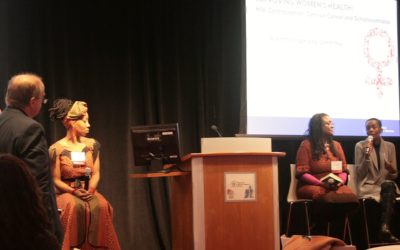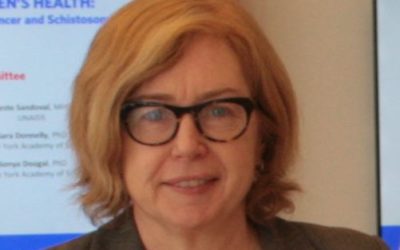Press
A core objective of BRIGHT Academy is to share our results, progress, and to increase the knowledge about Bilharzia.
In order to see the latest news about BRIGHT Academy: News section
Do you want to know what we are doing?
Follow us on Twitter.
A collection of high resolution downloadable photographs of the people of BRIGHT and our work can be found in our photo gallery.
For more questions please contact our communication officer:
Ida Amelie Mayes: [email protected]
South Africa no: (+27) 76 692 819
Norwegian no: (+47) 906 56 702
Follow on social media
Although the situations portrayed on this website are typical of the research none of the persons in this website are research patients (study participants). None of the persons portrayed in the treatment and investigative situations are minors. They have kindly given their permissions to publish the images.
Kinldy credit photographer Håvard Holme.
BRIGHT Academy @ New York Academy of Sciences
Coinciding with the United Nations Commission on the Status of Women, United Nations Joints Programme for HIV and AIDS (UNAIDS) held a meeting at New York Academy of Science to highlight recent advances and point out areas for synergy and collaboration with UNAIDS in three areas: (1) cervical cancer, (2) hormonal contraception, (3) female genital schistosomiasis (FGS). These three issues are currently not part of any HIV programme. Female Genital Schistosomiasis (Bilharzia, FGS) is a neglected tropical disease affecting approximately 55 million adolescent girls and women. Treatment for Bilharzia may reduce the risk of HIV infection, so there are opportunities for collaboration between HIV programmes and Bilharzia Control Programmes. HIV and FGS are “converging epidemics” which suffer from “lack of attention and lack of investment” said Professor Terry McGovern Similarly, in HIV prevention programmes there are possibilities to screen and prevent cervical cancer in women living with HIV. They are more likely to be infected with human papillomavirus (HPV), and up to 5 times more likely to develop both early and invasive cancers caused by HPV. Furthermore, a large randomised trial is underway and women and National HIV programmes are discussing the difficult choices that need to be made if the trial confirms certain types of contraceptives increase the risk for HIV. Organising committee: UNAIDS: Peter Godfrey-Faussett and Celeste Sandoval, WHO: Shona Dalal, CDC: Pragna Patel, NYAS: Sonya Dougal Talks: Annah Sango, Zimbabwe Young Positives Chelsea Polis, PhD, The Guttmacher Institute Danielle Engel, MA, United Nations Population Fund (UNFPA) Ebony Johnson, MHS, Global Coalition on Women and AIDS, Athena Network Erna Milunka Kojic, MD, Mount Sinai St Luke’s, Mount Sinai West,... read more10 Commitments to end AIDS
“The data is compelling, Female Genital Schistosomiasis should be there among the “10 Commitments”. It makes total sense to me that there is a link between FGS and HIV transmission.” Professor Terry Mc Govern, Columbia University Medical Center. Professor Terry McGovern founded the HIV Law Project in 1989 where she served as its director until 1999. In 1999, she was awarded an Open Society Institute Fellowship. From 2001 she was the Director of the Women’s Health and Human Rights Advocacy Project. Currently, she teaches Health and Human Rights and Environmental Justice. Professor McGovern successfully litigated numerous cases in UNited Stated including making the Social Security Administration expand HIV-related disability criteria so that women and low income individuals could qualify for Medicaid and social security, and a guideline restricting the participation of women of childbearing potential in early phases of clinical trials. From 2001, she has worked to improve the reproductive and healthcare of low- income women, and work on issues related to fundamentalisms and the impact on women’s human... read moreNew BRIGHT Research Station in Ugu South Africa
After a generous donation of buildings by the Royal Norwegian Embassy in Pretoria we opened the new BRIGHT Rural Research Centre in the presence of dignitaries from the Ugu Department of Health, and University of KwaZulu-Natal – Public Health / Obstetrics and Gynaecology, Ugu Hospitals, Oslo University Hospital (Norway) and University of Agder (Norway). The BRIGHT Rural Research Centre will provide training for PhD and Masters Students who will contribute to the work rural health problems. BRIGHT will facilitate interaction between researchers and implementers (policy makers and local departments) to allow for research that can contribute to better health . BRIGHT members have been largely from the medical profession but BRIGHT will widen its scope to encompass laboratory, education and social anthropological research. The new facilities will ensure a sustainable site for specimen storage and scientific excellence and will be the beginning of a permanent presence in the rural community. Back row from the left: Dr Busisiwe Dlamini (CEO and Medical Manager Port Shepstone Hospital), Professor and medical doctor Svein Gunnar Gundersen (University of Agder, Norway), Mr Carmelo Pistilli (Logistician, BRIGHT), Mr Rob Ferreira (CEO Margate Hospital), Mr Roy Farai Manyaira (Data manager/IT, BRIGHT) 7th row: Associate Professor and Psychologist Thirusha Naidu (University of KwaZulu-Natal (UKZN)), Dr Frank Olav Pettersen (CEO Norwegian Centre for Imported and Tropical Diseases), 6th row: Dr O Dabibi (CEO Murchison Hospital), Dr Saloshni Naidoo (Head of Department, Disci pline of Public Health, UKZN), Ms Thulisile Mkhize (Field assistant and transport, BRIGHT), Ms Sarah McKaw (CEO Margate Hospital), Ms Andile Mtshali (PhD student), Mr Edmore Mazani (Masters Student) 5th row: Dr Nonhlanhla Mbatha (Senior Lecturer Durban University... read moreNo Results Found
The page you requested could not be found. Try refining your search, or use the navigation above to locate the post.



